UK devolution: The view from the countryside
- Published
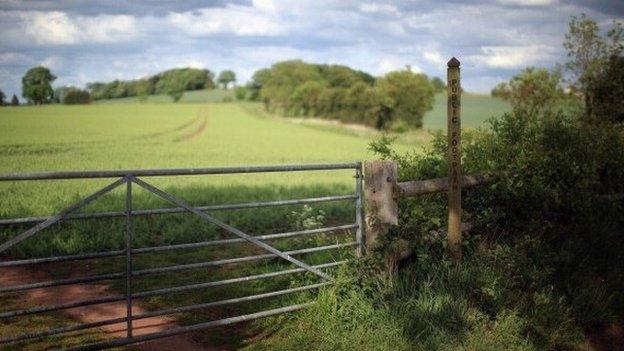
Chancellor George Osborne has put forward plans to give UK cities "a more powerful voice", and Labour leader Ed Miliband has set out plans for regional economic "powerhouses" to rival the capital. But how do those in rural communities feel?
It's 19:00 on the dot when Andrew Pike calls to order the meeting in Culmington Parish Council, which is congregated in a neat, modern village hall in the green and hilly Shropshire landscape north of Ludlow.
Nine people sit around on chairs, all seemingly relieved by the news that a controversial planning application to build a campsite nearby has been withdrawn.
This, it seems, is the bread and butter of the parish council's work. But the small band of committed volunteers take in a wide range of other issues too.
Some of the topics up for discussion - such as the positioning of Neighbourhood Watch signs, and how to prop up an aged tree in the parish - are specific to the landscape of Culmington.
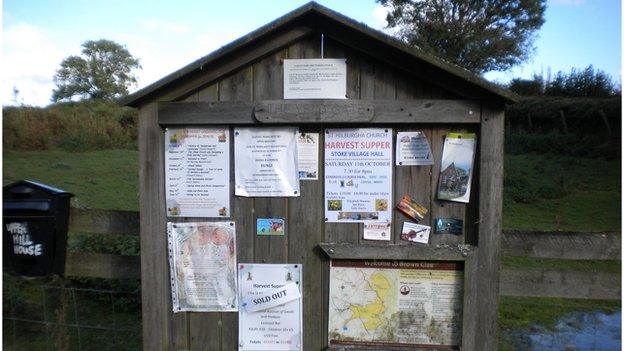
A community notice board at the top of Brown Clee, miles from the nearest village, is used for local news
But others - a disagreement over emergency services and local primary school staffing - are illustrative of the wider difficulties in providing services to rural communities.
Shropshire is a predominantly rural county, populated by just one person per hectare (107,600 sq ft) - the average for England and Wales is 16 - which presents logistical challenges in terms of healthcare transport, education and broadband access.
'Not designed for us'
These are the issues that come up time and again among local residents, according to Cecilia Motley, a Conservative member of Shropshire Council.
She attends similar meetings in nine different parishes in order to get an idea of what people are discussing in the far-flung corners of her ward, and feed those views back to the larger council.
One recurring source of frustration in rural Shropshire, she says, is the number of instances where "the rules are not designed with us in mind".
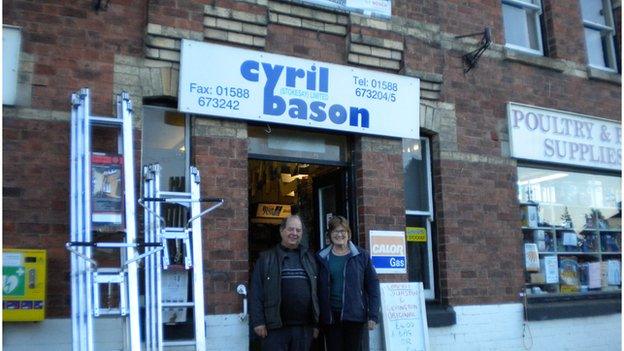
Councillors David Evans and Cecilia Motley in the Shropshire village of Craven Arms
Ms Motley gives the example of planning, where she says the need to demonstrate a demand for development projects over a number of consecutive years makes sense for areas where housing is highly sought-after, but not for Shropshire where demand is finite.
"Nobody sat down and thought through how it was going to play out in sparsely populated areas like Shropshire, Cumbria and North Yorkshire," she argues.
David Evans, another local councillor who runs a hardware shop and poultry business, agrees.
He sums up the problem: "The trouble is city people don't understand rural areas."
Both councillors are troubled by the idea of the countryside "as a theme park where you go for the weekend to breathe deeply and go cycling".
"Actually people live here and work here, and it's often very hard work," says Ms Motley.

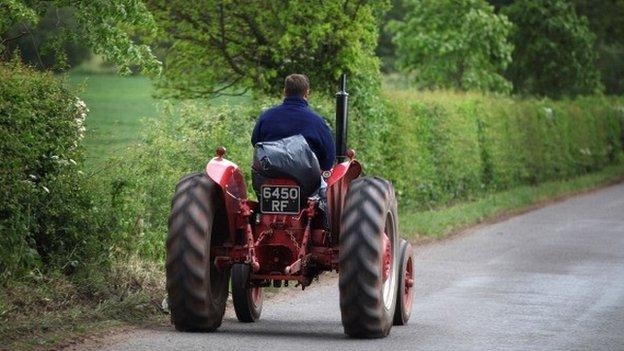
The rural economy in numbers
485,630 registered businesses in rural settings
3.1 million people employed in rural businesses
total turnover of £368bn
Biggest business sectors in rural areas:
agriculture, forestry and fishing (18% of registered businesses)
professional, scientific and technical services (15%)
trade and repair of motor vehicles (14%)
construction (12%)
Figures: 2012-13 Source: Defra

There have been a number of calls for cities to have more powers in the wake of the Scottish referendum.
On Monday, Mr Osborne said Greater Manchester would get an elected mayor and more control over taxes, suggesting other cities would be "keen to follow Manchester's lead".
Mr Miliband has also set out plans for local authorities in big cities to band together to create regional economic "powerhouses".
The RSA City Growth Commission published a report in October that recommended allowing UK cities to make their own decisions on tax and spending to boost economic growth.
However, in rural Shropshire, there's a feeling that politics is already dominated by urban concerns, and this would only get worse if more powers were devolved to cities.
"If money goes into the city of Birmingham it never comes out again. It'll be another case of power going to the big cities and they don't really worry about their rural areas, they're all looking after their own interests," says Mr Evans.
"What worries me is city-regions will not operate without bureaucracy - and that simply wouldn't be effective. What you get is not decentralisation but the top moving down to the regions," says Ms Motley.
The prevailing message seems to be that government should avoid a "one-size-fits-all" approach.
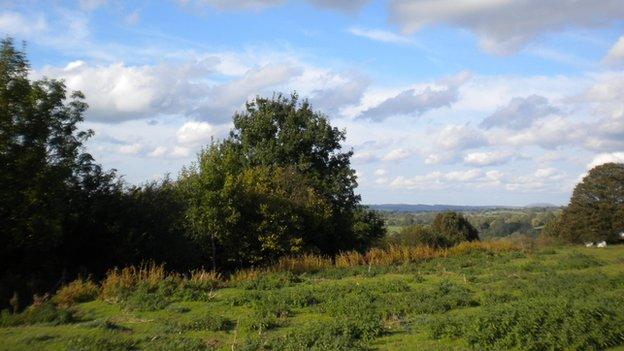
Picturesque locations such as this, near Stanton Lacy in Shropshire, can suffer from lack of access to services
'Smaller building blocks'
It's not just Shropshire where these frustrations are felt.
Anne McIntosh, the Conservative MP for Thirsk and Malton - who also chairs the Environment, Food and Rural Affairs Committee which published a report, external last year criticising the government for not doing enough to tackle rural issues - says there is concern in North Yorkshire too.
Discussing devolution, Miss McIntosh argues: "If Scotland gets more, and we're deciding how to devolve more powers within England, my feeling is that the building blocks should be smaller rather than bigger.
"I'm concerned about emphasis moving from Local Enterprise Partnerships - which work with district councils and county councils - to city regions. That would risk rural communities' voice being lost," she says.
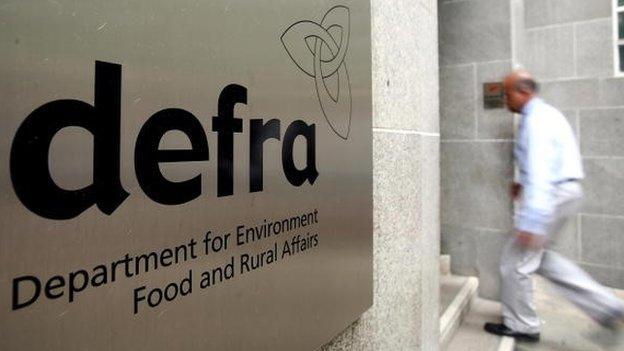
Defra's actions will be closely watched by parish councils such as Culmington
Another MP who sits on the committee is Labour's Mary Glindon, whose North Tyneside constituency is mainly urban but also takes in significant rural areas, composed mostly of arable farming.
She stresses that "if you have devolved powers to city-regions, you have to ensure a voice is given not just to urban communities but to people living rurally".
Most plans for devolution to cities assume transport would be part of the package, and Mrs Glindon says it's important people understand how critical transport links in remote areas are in providing access to jobs.
She is wary of what she describes as "one group of people - in cities - thinking they know best".
Fears have also been voiced by campaign group Action with Communities in Rural England, who say they don't want to see rural areas "left behind" by plans to give more power to cities.
The government has introduced several measures designed to champion rural issues, such as the establishment of the Rural Communities Policy Unit and its broadband rollout programme.
The Department for Environment, Food and Rural Affairs (Defra) has insisted it is "investing in rural broadband, mobile coverage and providing funding to develop and grow rural businesses".
However the government proceeds with plans to devolve powers, it will have to answer communities such as those in Culmington.
As the clock ticks towards 20:00 in the village's town hall in one evening in October, parish councillors are still in the thick of a debate on the intricacies of a planning application for a new farm building in the area.
It is thought to be intrusively tall and the assembled community conclude by vowing to haul in the applicant and go through his plans with a fine-toothed comb.
The impression is that while their version of local democracy may not be perfect, it works reasonably well, and any attempts to revamp it - or give more powers to nearby cities - will be closely watched.